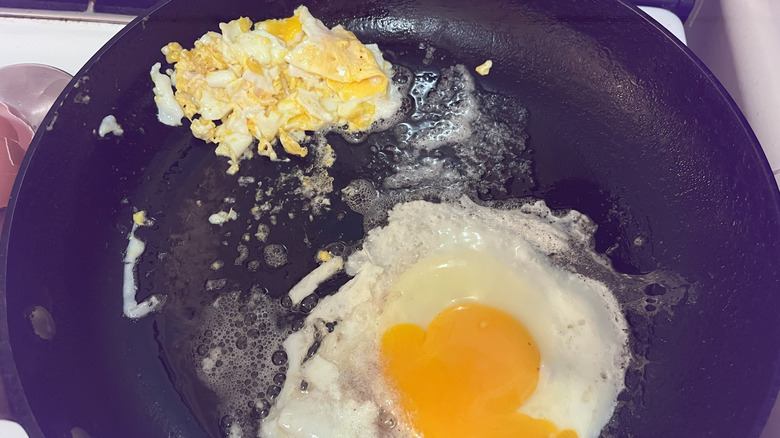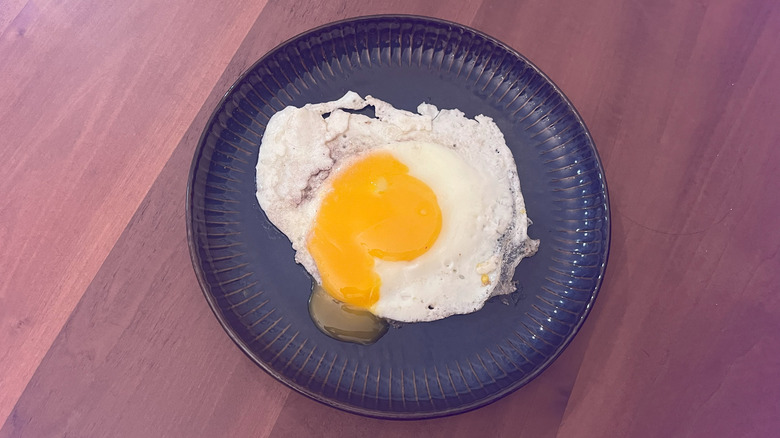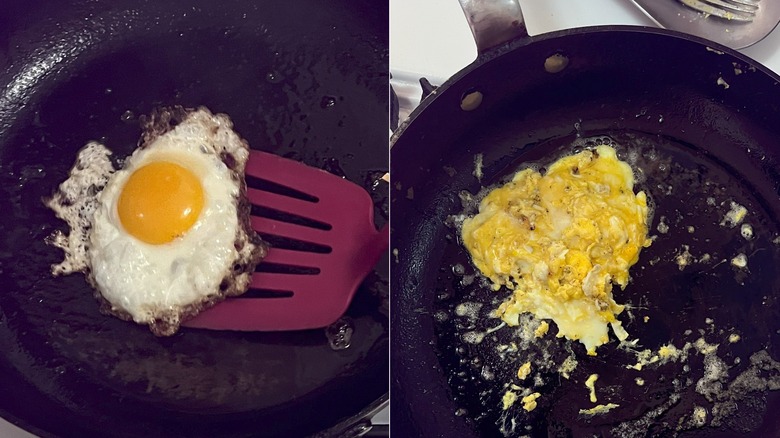Bacon Grease Vs Butter: The Ultimate Egg Test
We may receive a commission on purchases made from links.
Is there any food more versatile than the incredible, edible egg? But with a variety of egg preparations comes a variety of strong opinions of how best to prepare them. The Takeout is here to debate two luscious alternatives to cooking eggs in oil: bacon grease and butter.
Perhaps my Southern roots are showing, but going into this taste test, this writer was proudly Team Bacon Grease. No carnivorous kitchen back home is complete without a receptacle for storing and straining that liquid gold; I own this bacon bin. This pairs with my endeavors to keep as much food from going to waste as possible. Bacon grease can be used to cook a variety of foods, but eggs were one of the first foods I learned could benefit from a hit of smokey flavor and fat.
That said, I understand the value of adding butter to a dish — in fact, both butter and cream factor into my favorite method of scrambling eggs when I have the time. (More on that later.) Butter imparts more fat than oil does, and like bacon grease, injects the eggs with its flavor. Have I been led astray all these years? There's only one way to find out: cook eggs in both bacon grease and butter in two common styles and let our taste buds decide.
Watch eggs carefully when frying in bacon grease
We started with bacon grease, as we had conveniently just cooked a bit of bacon and its grease was waiting in our trusty Scanpan frying pan. (Over the years, this skillet became our home's official "bacon pan." Yes, we cook that much bacon.) We cooked up another slice to add more fresh grease to the pan, coming to roughly a tablespoon by our estimation. Once that was done, we kept the heat on and added an egg for frying. There are a lot of different ways to fry an egg, but we aimed for a crispy egg, wanting the egg to puff up and brown on its bottom, while keeping the yolk relatively soft.
The egg crisped up very quickly in its pool of bacon grease, faster than anticipated. Bacon grease has a higher smoke point than butter, meaning it can withstand higher temperatures in the pan before burning off. While this allows eggs cooked in bacon grease to fry faster throughout, opinions vary as to whether you should fry an egg in bacon grease, as it could burn quickly without proper supervision. Indeed, the egg fried in only a minute or two.
This egg fried in bacon grease wasn't overwhelmed with bacon flavor (surprisingly), which made for a nice balance of tastes. Perhaps because of how quickly it cooked, this would be the least fluffy egg prepared. All in all, a solid start to this experiment.
Eggs fried in butter are the perfect burger topper
I am fairly certain I've never fried an egg in butter, but there's a first time for everything. This household uses unsalted butter for all cooking, as I don't wish to put an additional, uncontrolled amount of sodium into my recipes. To fry up this egg, I eyeballed a pat of butter, again about a tablespoon's worth.
The yolk unexpectedly broke as I cracked the egg into the pan. An attempt to save it via scrambling was too late as the resulting egg was too hard. (Hey, you can't make content for a food website without breaking a few eggs.) The second fried egg was more successful. Notably, the egg had a softer edge than the one fried in bacon grease. This fried egg contained more butter flavor than the egg fried in bacon grease absorbed bacon flavor — perhaps too much to be enjoyed on its own.
My 9-year-old son, who assisted with these taste tests, remarked that the egg fried in butter reminded him exactly of the egg on his sandwich during our family's visit to the Gudetama Café. As a fan of topping burgers with a fried egg, I agree that the rich, creamy taste of this fried egg would create a great balance with a burger's bolder flavors. Add bacon to that burger and you'll have the best of both worlds.
Bacon grease turbocharges scrambled eggs with flavor
Frying the egg in bacon grease used up quite a bit of the pan's supply, so we supplemented the grease that was left with a small spoonful from the bacon bin. This is my everyday means of scrambling eggs, as not only does it keep the bacon grease from going to waste, but the pan becomes that much easier to clean later. And much like with frying the egg, scrambling eggs in bacon grease takes little to no time; just drop it into the pan and start breaking it up with a fork. Using a fork instead of a whisk will make the eggs creamy but not overly airy.
A caveat: If you want your eggs to be Instagram-worthy, then this cooking approach will disappoint. While delicious, the resulting egg is flecked with blackened bits of bacon fat, especially if putting the egg directly into the pan after cooking bacon. This issue shouldn't occur when using bacon grease as a substitute for butter in lower-heat cooking (such as baking). May we recommend using it to make bacon shortbread?
This method let the bacon taste come through much stronger than frying did, making for a more flavorful egg that didn't require further seasoning. If you want to impart a smokier flavor to your eggs, fry them in bacon grease.
When scrambling eggs with butter, listen to the experts
I mentioned earlier that my favorite technique for scrambling eggs requires extra time — but more accurately, it just requires more hands-on work than your typical scramble. Gordon Ramsay's approach creates the fluffiest scrambled eggs I've ever made. To cook this way, you crack the eggs into the pan, then add butter, then low heat. Every 30 seconds, take your pan briefly off the heat, then put it back on. This keeps going for three minutes — and you should be whisking the eggs the whole time. (Yes, this goes against my own fork-scrambling advice.) In the last minute of cooking, add a little salt and pepper, and crème fraiche, or really, whatever cream you have on hand. I've used sour cream, Greek yogurt, and heavy whipping cream at various times. For this taste test, however, we opted for a more straightforward approach.
As we did when scrambling in bacon grease, we simply re-upped the amount of butter in the pan, cracked the egg directly into the pan, and scrambled away with a fork. Without that extra cream or seasoning in the mix, however, the resulting egg delivers a mouthful of butter and only butter. With the right level of TLC, scrambling eggs in butter can be transformative. If you don't feel like putting in the extra work, perhaps use salted butter to scramble your eggs, or have seasonings ready.
The ultimate egg test: and the winner is...
This is a tougher verdict to make than I would have imagined going into this taste test, as all preparations have their pros and cons. So, we're going for the split decision: We're going to crown different winners based on preparation. Ultimately, the best choice will come down to how you're using the egg. Will it be the supporting player, or the star of your plate?
If you prefer fried eggs, fry them in bacon grease. A fried egg has such a great balance of flavors and textures, and bacon plays along, adding just the right level of smokiness without overwhelming what makes a fried egg so gratifying. Critically, an egg fried in bacon grease can stand on its own — there's no need to hide it under a burger bun, as delicious as that butter-fried egg would be as a topping.
If you prefer scrambled eggs, scramble them in butter — but don't just throw them into the pan and hope for the best. While you may achieve a more pleasing look and texture, using butter alone can obliterate the egg's natural flavor profile. Finesse them with seasoning and extra cream for a beautifully fluffy dish. Butter-scrambled eggs pair well with a thick, toasted sourdough slice, or on English muffins with Canadian bacon for eggs benedict (without the effort of making hollandaise sauce).





